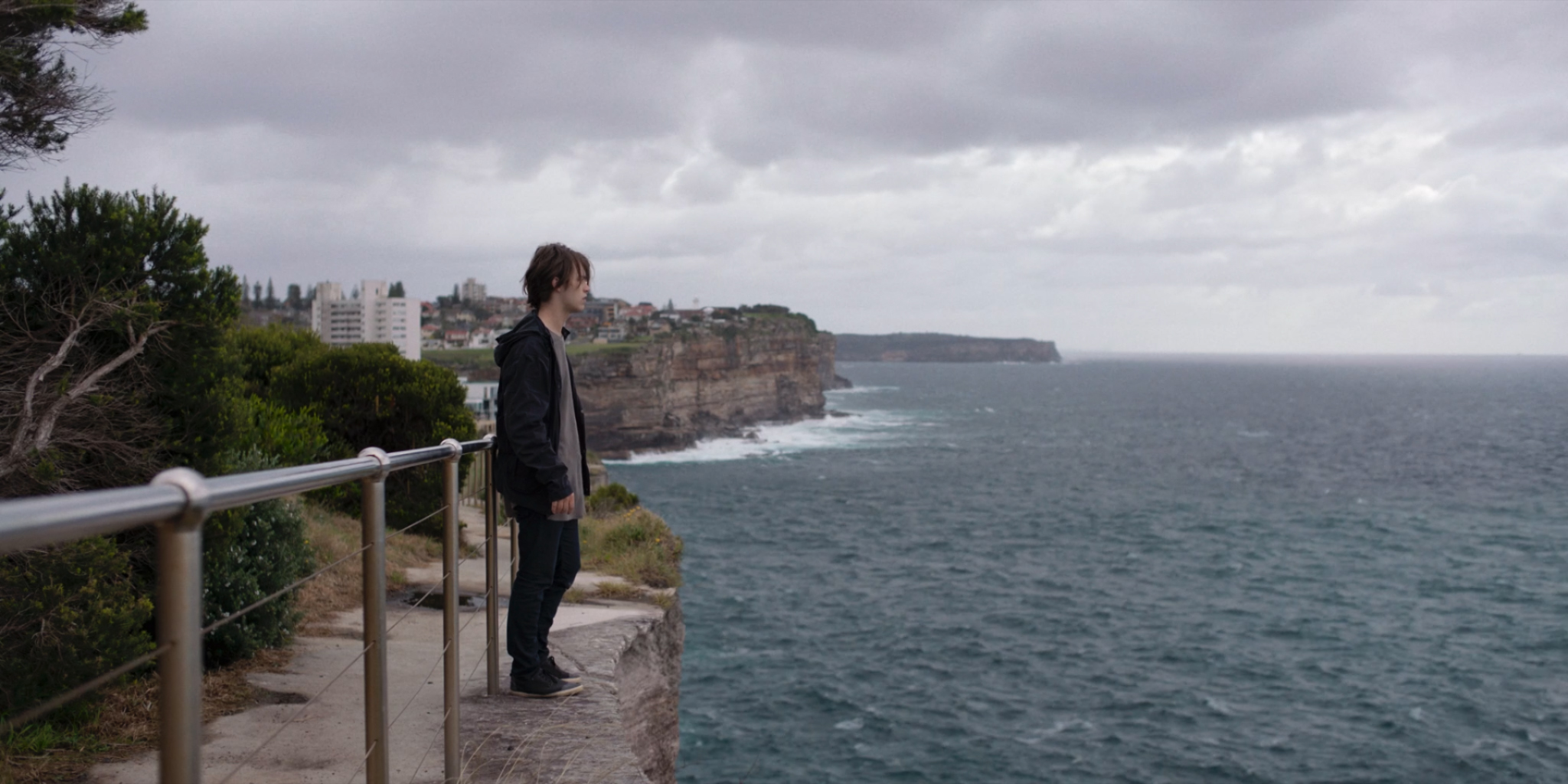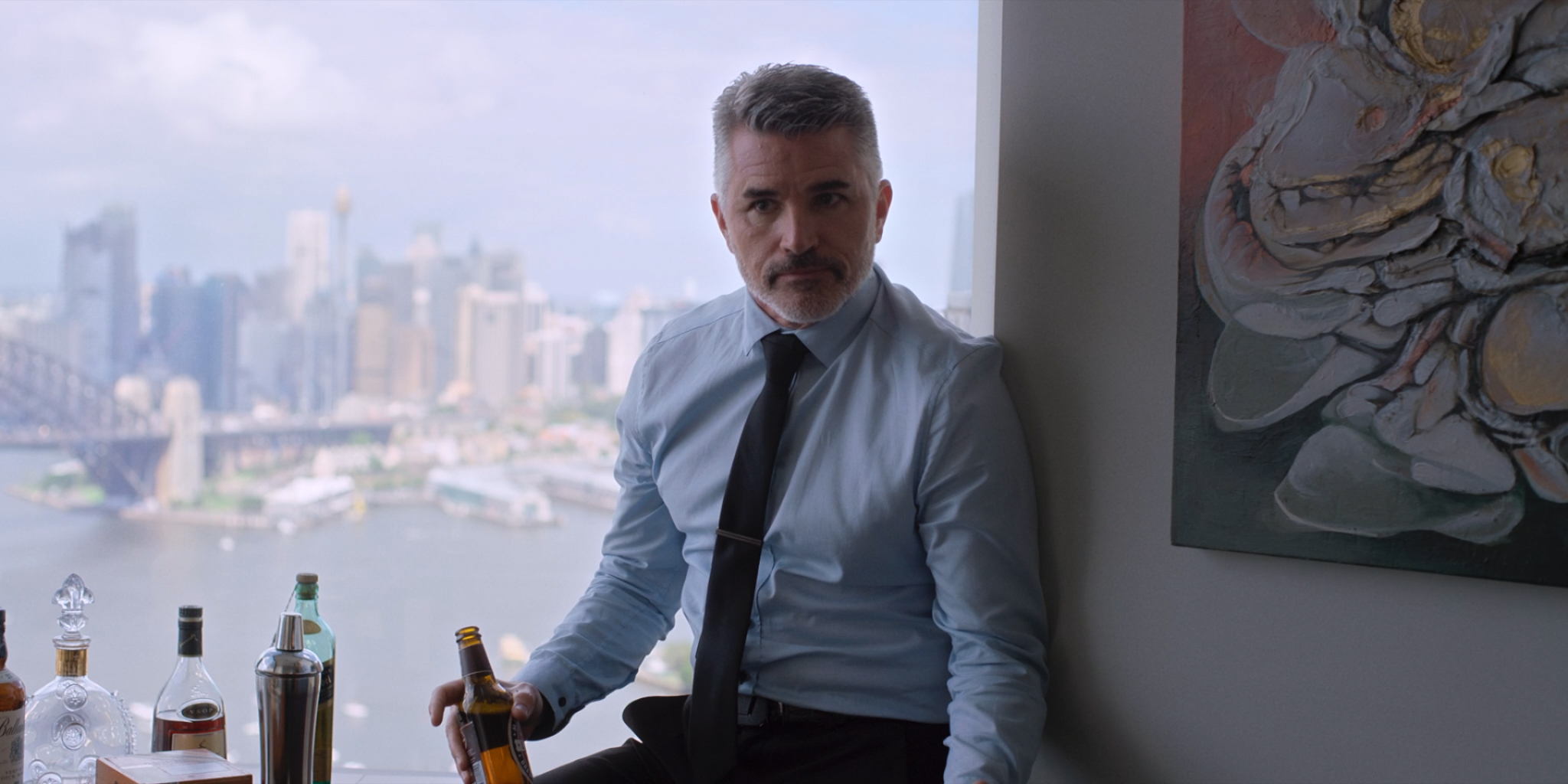Jason Knight doesn’t want to be here anymore. We learn this early on in Everything in Between, when the young man exits an Uber in a depressed daze and makes his way to the Sydney cliff edge where he plans to end his life. He’s stopped from doing so by the Uber driver, who discovered that Jason left his bag in the car. That kicks in a series of intervention methods that will prevent Jason from “completing” – an all-too-familiar series of methods, given the way suicide has come to the forefront of our fraught mental health times.
Barring some sort of extreme tragedy or extreme sense of culpability, we aren’t often afforded a satisfying explanation for why a person kills themselves; from the perspective of happier people, any reason seems short of reaching critical mass, because happy people understand that “it gets better.” Unhappy people don’t, or can’t.
Still, Everything in Between, the new film from Sydney filmmaker Nadi Sha, attempts to provide an explanation. Even by these standards, it isn’t a great one: Jason (Jordan Dulieu) tells the American he meets at the hospital, Liz (Freyja Benjamin), that “nothing matters, we’re all just a collection of atoms.” While quite probably true, this realisation hasn’t caused millions of others to top themselves. But then that gets back to the depressive tunnel vision of the unhappy person.
If we’re looking for evidence beyond Jason’s words, the film certainly gives it to us in the form of his parents, David (Martin Crewes) and Meredith (Gigi Edgley), who are materially successful, but each a hot mess in their own way. David has an impressive office job in one of the city’s tallest skyscrapers, but he’s a skirt chaser who is cheating on his wife, and his way of relating to his son is a callous “buck up, lad” mentality that involves too many offers of a ”cold one” and too many cheeky grins. Meredith is a day drinker who becomes belatedly overprotective once the suicide attempt is revealed, trying to make up for years of ambivalence about parenthood.
Yet these role models – with whom the film spends quite a bit of time – don’t really seem to explain Jason’s mental state either. More clues are that, by his own admission, he doesn’t relate well to other people; David says, during an argument with his wife, that his son has “never had a friend,” which seems hard to believe given Jason’s good looks and capacity for empathy. He displays the latter quality pretty quickly in his interactions with Liz, who has lived a life of spiritual engagement and the associated drug-related experiences – and as a result, seems to have contracted a rare fungus that could be life-threatening.
Measuring the success or failure of Everything in Between on how well it explains Jason’s suicidal thoughts is probably unfair, because as we’ve determined by now, the decision to kill yourself is rarely defensible on rational grounds. Rather, it’s what Sha does with it that could set the film apart, and Everything in Between runs into a bit of trouble there. The superficial reading of the film’s message – and that may be the only reading available – is that Liz’s manic pixie dream girl with a potentially fatal illness is just the sort of thing Jason needs to shake his cosmically informed malaise and conclude that life is worth living. Unfortunately, that subject matter doesn’t give the film enough clearance between it and a Nicholas Sparks movie, or more generously, a popular hit like The Fault in Our Stars.
The good news is that Sha’s earnestness is not soppy, and it takes Everything in Between farther than it might otherwise go. We’ve got a game cast giving generally good performances, toward ends that obviously mean something to the filmmaker. The conflict between the spiritual and the scientific is explored in useful ways, even if no conclusions are reached – which is probably what one should expect in this sort of open-ended, existential topic.
The most specific performance belongs to Crewes as Jason’s father, and in this performance, we may be getting closer to a message beyond the general one that suicide is bad and that we should work to prevent it. Crewes plays a very particular sort of Australian male, a larrikin who’s quite charming but reveals a sort of casual misogyny in his everyday interactions with women. Some of his questionable advice poisons Jason’s attempts to ingratiate himself to Liz, but oddly, some of it is actually on point, if a little roughly presented.
Sha and Crewes can be commended for not turning David into a caricature, despite flirting with that on occasion, but then it’s not entirely clear what the writer-director is trying to say about the toxic masculinity of Australian males. If this were a true critique of inherited behaviours, there’d be more of David visible in Jason, who is effectively his polar opposite in terms of confidence and sociability. David is ultimately given a fair shake here, which is a bit of generosity by the filmmaker, if ultimately a thematic dead end.
No one film is going to solve the problem of what drives a person to consider ending their life, and Everything in Between gets tripped up by its old-fashioned notion that a person might be happier if they just find someone to love. However, there are some astute observations mixed in that make the experience worthwhile. One suspects that the need to market his film to the same target audience as The Fault in Our Stars might have played a role in some of Sha’s decisions. That’s one cold hard reality that will probably never change.
Everything in Between opens in select cinemas tomorrow.



